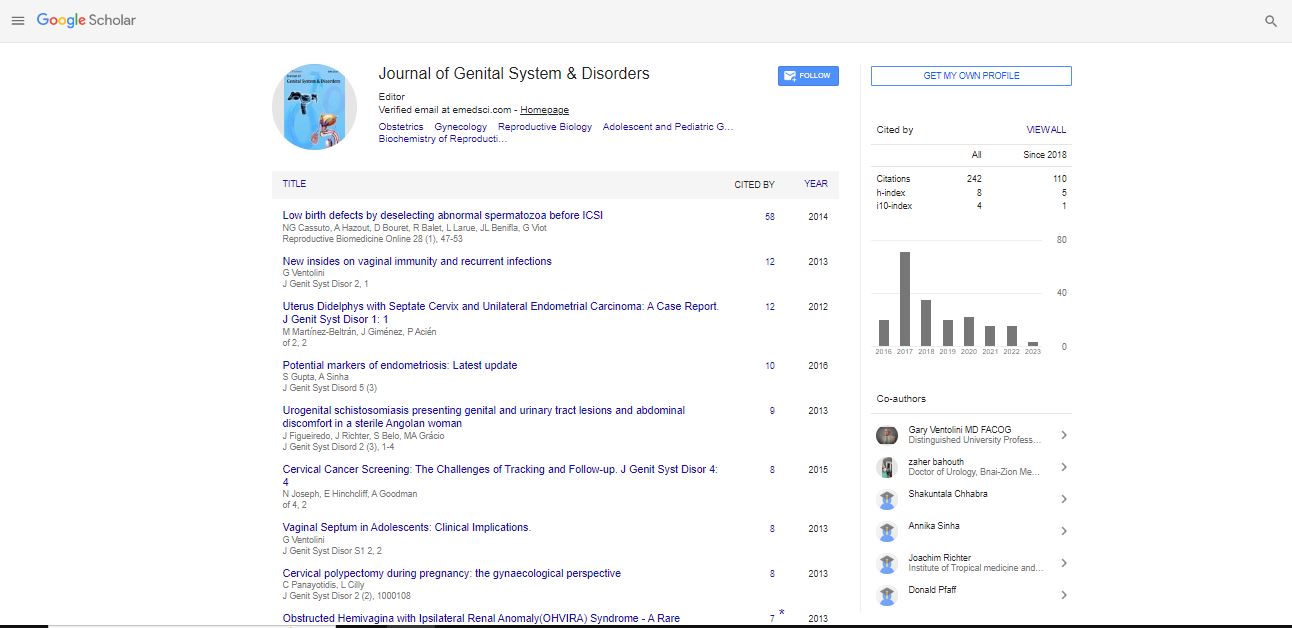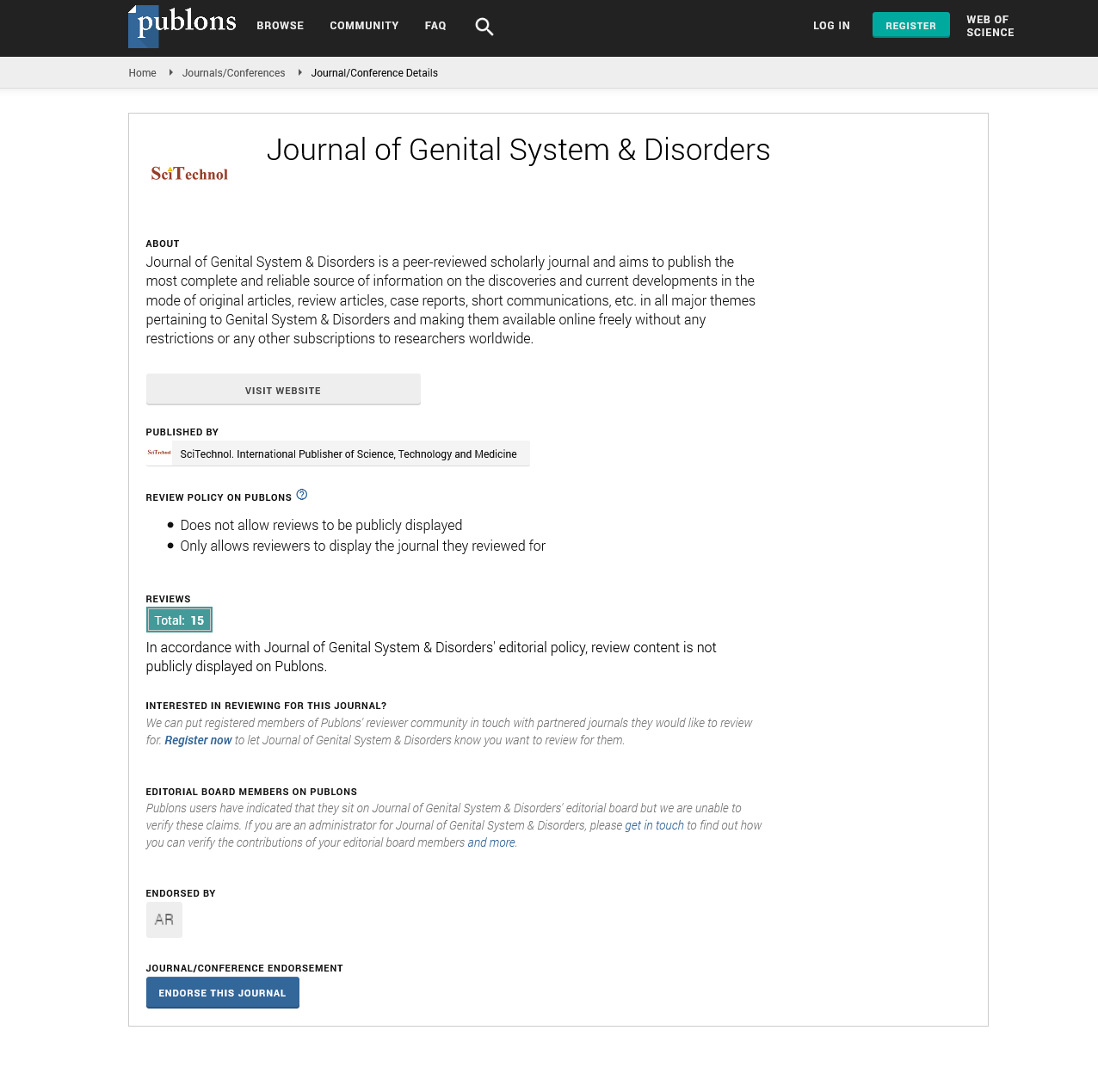Short Communication, Vol: 12 Issue: 3
The Role of Genetics in Reproductive Medicine From Diagnostics to Therapeutics
Antonio Beltran*
1Department of Psychology, Queen's University, Kingston, Canada
*Corresponding Author: Antonio Beltran,
Department of Psychology, Queen's
University, Kingston, Canada
E-mail: Beltran@Antonio.ca
Received date: 30 August, 2023, Manuscript No. JGSD-23-117042;
Editor assigned date: 01 September, 2023, PreQC No. JGSD-23-117042 (PQ);
Reviewed date: 15 September, 2023, QC No. JGSD-23-117042;
Revised date: 22 September, 2023, Manuscript No. JGSD-23-117042 (R);
Published date: 29 September, 2023, DOI: 10.4172/2325-9728.1000290
Citation: Beltran A (2023) The Role of Genetics in Reproductive Medicine from Diagnostics to Therapeutics. J Genit Syst Disord 12:3.
Abstract
Description
Reproductive medicine has undergone remarkable advancements in recent decades, with genetics playing an increasingly pivotal role in the field. From diagnosing genetic disorders to offering therapeutic solutions, genetics has revolutionized the way we approach infertility, pregnancy, and the health of newborns. This essay explores the multifaceted role of genetics in reproductive medicine, focusing on its contributions in diagnostics and therapeutics, and the ethical considerations that accompany these developments. One of the most significant contributions of genetics to reproductive medicine is preconception genetic testing. This practice allows prospective parents to assess their carrier status for various genetic disorders, such as cystic fibrosis, sickle cell anemia, and Tay-Sachs disease. By identifying these carriers, couples can make informed decisions about family planning, including pursuing Assisted Reproductive Technologies (ART) or prenatal testing.
Preimplantation Genetic Testing (PGT) is another genetic diagnostic tool that plays a pivotal role in reproductive medicine. During In Vitro Fertilization (IVF), PGT involves screening embryos for genetic abnormalities, such as chromosomal aneuploidies or single gene mutations. This technology aids in selecting the most viable and healthy embryos for implantation, reducing the risk of genetic disorders and miscarriages [1].
Advancements in genetics have also enhanced the accuracy and availability of prenatal genetic testing. Non-Invasive Prenatal Testing (NIPT) and traditional methods, like amniocentesis and Chorionic Villus Sampling (CVS), allow for the early detection of chromosomal abnormalities, such as Down syndrome, as well as other genetic conditions. Timely diagnosis empowers parents to make informed choices about pregnancy management, including the option of termination in case of severe genetic disorders [2].
Genetic information can aid in creating personalized fertility treatment plans. By understanding a couple's genetic factors, medical professionals can tailor fertility treatments, like IVF, to optimize their chances of success [3]. This approach may involve selecting specific medications, adjusting dosages, or choosing the most suitable embryo transfer protocol. Genetics also plays a role in developing novel therapies for infertility. In cases of male infertility caused by genetic factors, such as Y-chromosome microdeletions or chromosomal abnormalities, genetic interventions like Testicular Sperm Extraction (TESE) and Intra Cytoplasmic Sperm Injection (ICSI) can be employed. These procedures can help men with otherwise intractable infertility issues father children [4-7].
Mitochondrial replacement therapy is an emerging genetic therapeutic option. This technique allows for the replacement of defective maternal mitochondria in an egg with healthy mitochondria from a donor egg. It can prevent the transmission of mitochondrial DNA-related diseases from mother to child, showcasing the potential of genetics in therapeutics. While genetics in reproductive medicine offers numerous benefits, it also raises complex ethical concerns. The use of PGT raises questions about the selection of embryos based on non-medical traits, such as gender or physical characteristics. The potential for designer babies and societal pressures to conform to certain ideals are ethical dilemmas that must be addressed [8].
The storage and management of genetic information in reproductive medicine raise concerns about privacy and data security [9]. Ensuring the protection of sensitive genetic data is essential, as breaches could have far-reaching consequences for individuals and families. Recent advances in genetic editing technologies, such as CRISPR-Cas9, have opened the possibility of germ-line editing, which could result in heritable genetic modifications. The ethical implications of this technology, including concerns about unintended consequences and the potential for "designer babies," must be carefully considered [10].
The availability of genetic diagnostics and therapies in reproductive medicine may create disparities, as these technologies can be expensive and may not be accessible to all. Ensuring equitable access to these advancements is a pressing ethical challenge. Genetics has become an indispensable tool in reproductive medicine, offering a range of diagnostic and therapeutic options that have transformed the field. From preconception testing to advanced fertility treatments, genetics has opened new doors for individuals and couples seeking to have healthy offspring. However, these advancements also come with ethical considerations that require careful consideration and regulation. As genetics continues to shape the landscape of reproductive medicine, it is crucial to strike a balance between innovation and responsible, ethical practice, ensuring that these powerful tools benefit all of humanity.
References
- Victor BP (2002) Preventing congenital anomalies in developing countries. Community Genet 5: 61-69.
[Crossref] [Google Scholar] [Pubmed]
- Taye M, Afework M, Fantaye W, Diro E, Worku A (2018) Factors associated with congenital anomalies in Addis Ababa and the Amhara region, Ethiopia: A case-control study. BMC Pediatr 18: 142.
[Crossref] [Google Scholar] [Pubmed]
- Mekonnen GA, Hordof AG, Kitila TT, Adem S (2020) Modifiable risk factors of congenital malformations in bale zone hospitals, southeast Ethiopia: an unmatched case-control study. BMC Pregnancy and Childbirth 20: 129.
[Crossref] [Google Scholar] [Pubmed]
- Little J, Arslan MT, Mossey PA (2004) Smoking and orofacial clefts. A United Kingdom–based case-control study. Cleft Palate Craniofac J 41: 383-386.
[Crossref] [Google Scholar] [Pubmed]
- Graham TP, Driscoll CDJ, Gersony WM, Newburger JW, et al. (2005) Task Force 2: Congenital heart disease. J Am Coll Cardiol 45: 1326-1333.
[Crossref] [Google Scholar] [Pubmed]
- Naeimeh T, Katayon Y, Nazila N (2010) The Prevalence of congenital malformations and its correlation with consanguineous marriages. Oman Med J 25: 37-40.
[Crossref] [Google Scholar] [Pubmed]
- Alverson CJ, Strickland MJ, Gilboa SM, Correa A. (2011) Maternal smoking and congenital heart defects in the Baltimore-Washington infant study. Pediatrics 127: 647-653.
[Crossref] [Google Scholar] [Pubmed]
- Godwin KA, Sibbald B, Bedard T, Kuzeljevic B, Lowry RB, et al. (2008) Change in frequency of select congenital anomalies since the onset of folic acid fortifications in Canadian birth defect registry. Can J Public Health 99: 271-275.
[Crossref] [Google Scholar] [Pubmed]
- Shaw GM, Quach T, Nelso V, Carmichae SL, Schaffer DM, et al. (2003) Neural tube defects associated with maternal periconceptional dietary intake of simple sugars and glycemic index. Am J Clin Nutr 78: 972–978.
[Crossref] [Google Scholar] [Pubmed]
- Neumann PE, Frankel WN, Letts VA, Coffin JM, Copp AJ, et al (1994). Multifactorial inheritance of neural tube defects: Localization of the major gene and recognition of modifiers in ct mutant mice. Nat Genet 6: 357-362.
[Crossref] [Google Scholar] [Pubmed]
 Spanish
Spanish  Chinese
Chinese  Russian
Russian  German
German  French
French  Japanese
Japanese  Portuguese
Portuguese  Hindi
Hindi 
